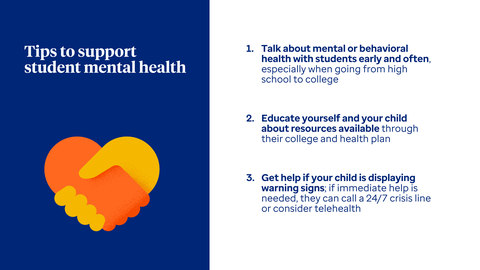The data reveal high school and college students self-report similar mental and behavioral health concerns, but at significantly different rates
Data suggest more frequent conversations between students and parents may impact outcomes
UnitedHealthcare today announced new survey findings from its second annual Student Behavioral Health Report, revealing college students are more likely to self-report they or a roommate/friend encountered high-risk mental or behavioral health concerns in the past year compared to high school students.
This press release features multimedia. View the full release here: https://www.businesswire.com/news/home/20240516260578/en/

Tips to Support Student Mental Health. UnitedHealthcare Student Behavioral Health Report. (Graphic: Business Wire)
Findings further show a significant gap remains between what college students self-report and what parents of college students perceive. In contrast, parents of high schoolers report perceptions closely aligned with the experiences high school students self-report.
Data reveal among college students, 77% self-reported they or a classmate or friend encountered at least one mental or behavioral health concern in the past year, including anxiety/stress (55%), depression (41%) and suicidal ideation and intent* (13%). These figures represent a near-50% jump compared to self-reported high school student experiences with the same concerns (35%, 20% and 9%, respectively). Further, data show parent perceptions of these concerns do not change from high school to college – highlighting a possible “perception gap” that may impact parent-child conversations.
The Student Behavioral Health Report also reveals additional insights, including:
- An association between more frequent discussions of students’ mental or behavioral health and significant increases in students self-reporting feeling “supported.”
- Trends in the influencing factors that may surround students’ mental and behavioral health across high school and college years.
- Key differences in the way parents understand challenges facing high school vs. college students.
“Youth mental and behavioral health remains an urgent priority. The challenges students experience increase dramatically during college and parents may not realize it,” said Dr. Donald Tavakoli, national medical director for behavioral health, UnitedHealthcare. “Recognizing the potential gaps between parent perceptions and student experiences, especially in the transition from high school to college, can help parents stay connected and supportive.”
"Conversations about emotional health, whether peer-to-peer or intergenerational, can be uncomfortable or difficult to navigate,” said John MacPhee, CEO of The Jed Foundation (JED). “These new data from UnitedHealthcare underscore the importance of frequent discussions between parents and their children, which can make a substantial difference in a young person's life, empowering them to seek support."
To help parents talk to their kids about mental well-being and spark conversations that move past one-word answers, UnitedHealthcare offers parent and youth conversation starter cards.
For those seeking support, UnitedHealthcare helps guide people to the right care at the right time across a broad range of behavioral health solutions. This includes digital self-care tools, telephonic emotional support, coaching, in-person and virtual visits, family support, employee assistance programs and more, allowing individuals to access support in a variety of ways.
For more information about behavioral health resources, visit UHC.com and UnitedHealthcare Student Resources. To explore additional data, insights and trends, access the full report here.
About the Student Behavioral Health Survey and Report
Commissioned by UnitedHealthcare and conducted by YouGov, “The Student Behavioral Health Report” surveyed a total sample of 2,058 Americans, of whom 526 are U.S. college students, 529 are parents of college students, 501 are high school students and 502 are parents of high school students. Fieldwork was undertaken between September 1 and October 12, 2023. The survey was carried out online.
* The term “thoughts of self-harm” was used for high school students vs. “suicidal ideation and intent” for college students. |
About UnitedHealthcare
UnitedHealthcare is dedicated to helping people live healthier lives and making the health system work better for everyone by simplifying the health care experience, meeting consumer health and wellness needs, and sustaining trusted relationships with care providers. In the United States, UnitedHealthcare offers the full spectrum of health benefit programs for individuals, employers, and Medicare and Medicaid beneficiaries, and contracts directly with more than 1.5 million physicians and care professionals, and 7,000 hospitals and other care facilities nationwide. The company also provides health benefits and delivers care to people through owned and operated health care facilities in South America. UnitedHealthcare is one of the businesses of UnitedHealth Group (NYSE: UNH), a diversified health care company. For more information, visit UnitedHealthcare at www.uhc.com or follow UnitedHealthcare on LinkedIn.
View source version on businesswire.com: https://www.businesswire.com/news/home/20240516260578/en/
Contacts
Will Holman
952-931-5926
william_s_holman@uhc.com





